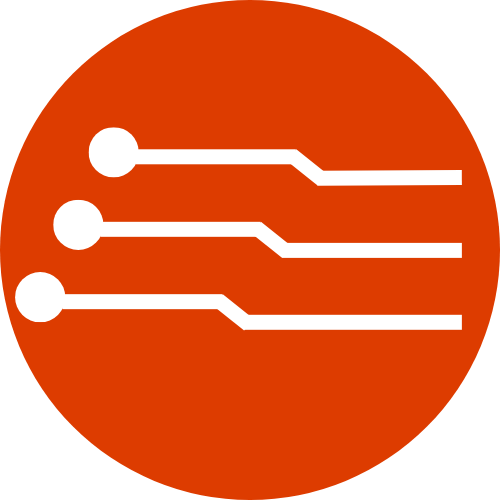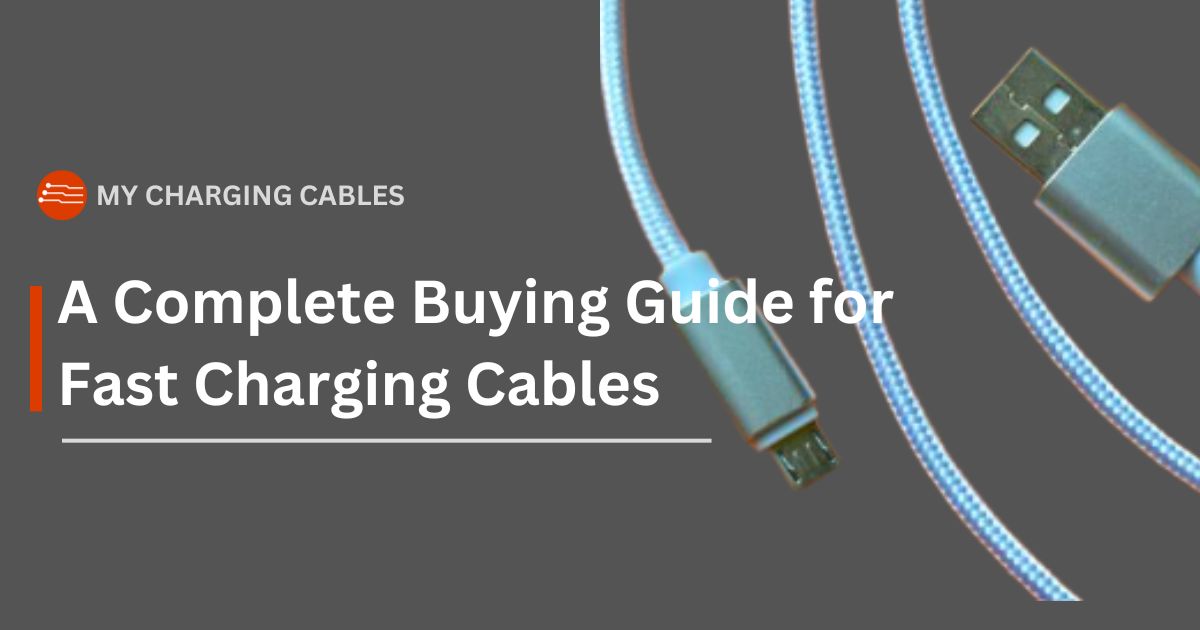In this digital world where we are living with our gadgets, they need to be charged when it is needed, but we have no time or patience to grant some time to it. Because, Time is very important, especially when it comes to charging the devices. Waiting hours for our smartphone or tablet etc., can be frustrating.
So we are trying to find fast charging cables to power up our devices faster and smarter.
In this comprehensive article, we will explain everything you need to know about fast charging cables buying guides. By understanding the technology used behind them to make the right decision for your devices.
Table of Contents
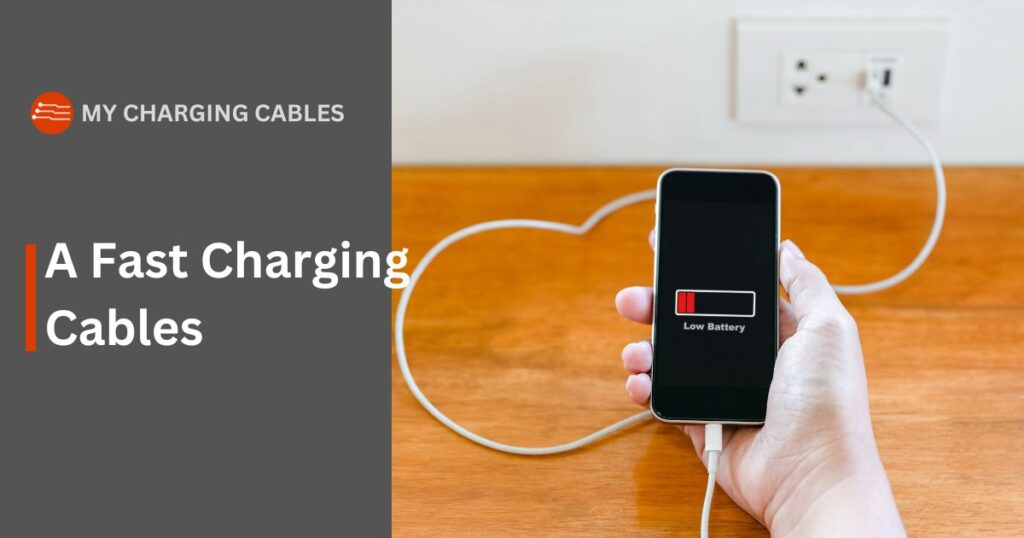
Understanding Fast Charging Cables Technology
Before going into the world of fast charging cables, first, we understand the technology that makes them work fast. Every fast-charging cables relies on several key points:
- Voltage
- Amperage (Current)
- Connector Type
- Device Compatibility
1. Voltage: For faster charging time, it is essential that fast charging cables can have higher voltage levels to deliver more power to your device; hence resulting in faster charging.
2. Amperage (Current): A current unit is an Ampere, which can determine a cable how quickly can transfer energy. Hence, higher amperage means the cable is faster charging.
3. Connector Type: The type of connector on your cable is important. When it comes to fast charging, USB-A, USB-C, and Lightning ports all have different capacities.
4. Device Compatibility: Because not all smartphones have fast charging, you must confirm that your device is compatible with the cable you selected.
READ MORE: 10 Easily Tips to Extend the Charging Cable Lifespan

Types of Fast Charging Cables
Fast charging cables are available in a variety of styles and connections. Here’s an overview of the most common cables:
- USB-C to USB-C: These cables are adjustable and work with a wide range of modern devices, including smartphones, laptops, and tablets. They frequently support fast charging techniques like power supply
- USB-A to USB-C: If you have older devices with USB-A ports, these cables still deliver a faster charging experience when connected to relevant chargers.
- USB-C to Lightning: These cables, which are designed specifically for Apple devices, provide fast charging for iPhones and iPads when linked with a suitable charger.
- Micro USB to USB-C: These cables are ideal for older Android devices and can still provide fast charging speed growth if your device supports it.
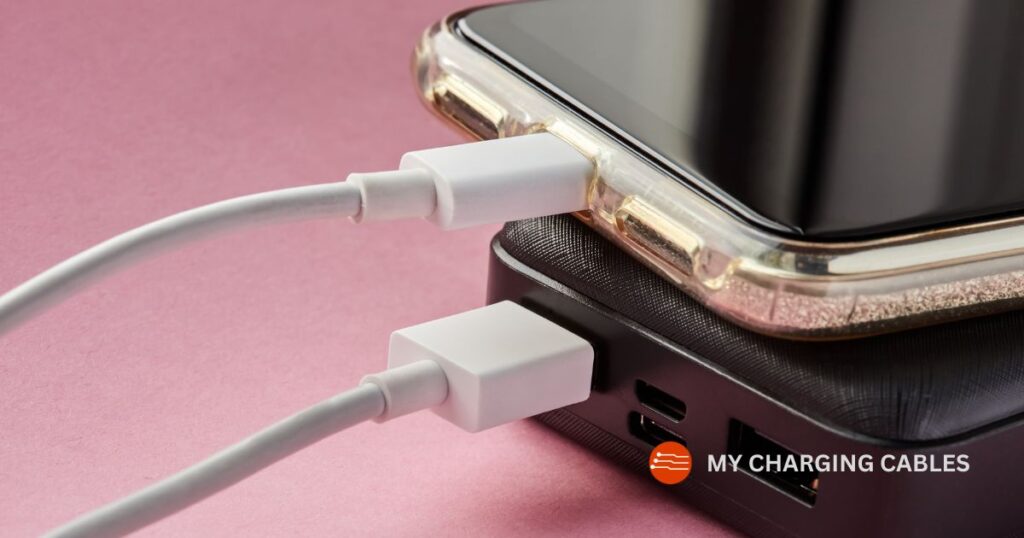
Cables for Fast Charging vs. Cables for Ordinary Charging
USB cables have a big impact on how quickly your device’s battery is charged. If you want your device to charge faster with quick charging technology, you have to use a fast-charging source of power and connection.
There are several sorts of USB cables, but you may not be able to tell them apart physically. So, how do you tell the difference between an ordinary USB cable and a fast-charging cable? Here are some major points to be considered:
The first distinction is how much power they provide to your device’s battery in a certain amount of time. Fast-charging cables transfer more power than standard cables, allowing you to charge your battery faster.
Regular USB cables give about 2.5 Watts of electricity to your device’s battery, whereas fast-charging cables offer up to 120 Watts, charging phones in half an hour or an hour.
If you have a fast-charging charger and charge your device with a typical USB cable, the cable will not charge your device faster. This is due to the limited power available for your Android devices via a standard cable.
Standard wires in normal cables can carry approximately 0.5A of current, whereas fast-charging cables can carry more than 2.0A.

The Advantages of Fast-Charging Cables
As said before, the speed of a charging cable depends on the amount of electricity it is designed to transport. It is also affected by the size of the wire contained within the cable. Bigger wire transfers have greater current in effect.
Regular USB cables use standard-sized 28 gauge wires, whereas fast charging cables use larger wires that allow for a higher current supply at the same time.
Factors to Consider When Buying Fast Charging Cables
Choosing the best fast-charging cable can be challenging. But Consider the factors that follow in order to make a smart choice:
- Device Compatibility
- Cable Length
- Durability
- Brand Reputation
- Certifications
- Charging Speed
- Connect the Device
1. Device Compatibility: Examine whether your smartphone supports fast charging and which standards it follows, such as Qualcomm Quick Charge or USB Power Transfer.
2. Cable Length: Longer cables allow more flexibility, but they may result in slower charging speeds. Balance what you want for speed and convenience.
Fast charging cables are thicker than regular ones, as they carry a high current so consider it.
3. Durability: Search for cables having reinforced connectors and materials that are durable enough to resist daily use.
4. Brand Reputation: Always buy from certified stores, to save you from the difficulty of distinguishing and identifying fast-charging cables. It is the best practice to go to your smartphone manufacturer’s store because they provide specific and genuine cables for your device that charge your phone faster.
5. Certifications: Make sure the cable has been certified by a relevant body part, such as USB-IF for USB cables or Apple’s MFi (Made for iPhone/iPad) certification for Lightning cables.
6. Charging Speed: Pay close attention to the charging speed features of the cable. Some cables can charge faster than others.
7. Connect the Device: Connecting a fast charger to your device is an easy way to identify it. A quick USB cable displays a lightning bolt in your smartphone’s charging symbol. If this isn’t clear, you can check your battery settings for “fast charging.” This will only work if your device supports fast charging.

Common Myths About Fast Charging Cables
There are numerous myths and misconceptions about fast-charging cables. Let’s dispute a few myths:
- All Cables Are the Same: False. Fast charging cables are different from normal cables in that they are built to handle higher power levels.
- Fast Charging Damages Batteries: Modern gadgets are generally built with protections to prevent battery damage during fast charging. Fast chargers and cables designed for your smartphone are safe to use.
- You Need Expensive Cables for Fast Charging: While quality is important, the most expensive cables are not always required. Look for authorized cables from well-known manufacturers.
Conclusion
Fast-charging cables have changed the way we charge our smartphones, saving us valuable time and stress. With the help of our buying guide, you should be able to make an informed decision. When choosing the best fast-charging cable, keep your device compatibility, cable type, durability, and brand name in mind. This ensures that your gadgets are always prepared to use, keeping you connected in the modern age. Good luck with your charger!
FAQs related to Fast Charging Cables Buying Guide
1. What is a fast-charging cable, and how does it work?
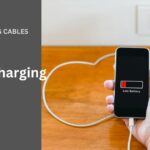
A fast-charging cable is designed to provide a device with more voltage and amperage, allowing it to charge faster. It functions by increasing the amount of power transferred between the charger and the device.
2. Are all fast-charging cables the same?
No, fast-charging cables come in various types and standards. They differ in terms of connectors, compatibility, and supported charging protocols.
3. Which devices support fast charging?
Fast charging is supported by many modern smartphones, tablets, and computers. However, it is important to check the specifications of your device to ensure connectivity.
4. Does using a fast charging cable damage my device’s battery?
In general, no. Some present smartphones have built-in safeguards to protect batteries during fast charging. The use of a cable suitable for your device is essential for safe charging.
5. Can I use a USB-A to USB-C cable for fast charging?
Yes, but charging speed may be slower than with a USB-C to USB-C cable. To maximize fast charging, take a cable that suits the charging port on your device.
6. Can I use a fast charging cable with a standard charger?
Yes, you can use a fast charging cable with a regular charger, but it will not charge your mobile faster than the maximum output of the charger.
7. Are longer fast-charging cables less efficient?
Longer cables can experience some power loss, which may slightly reduce charging speed.
